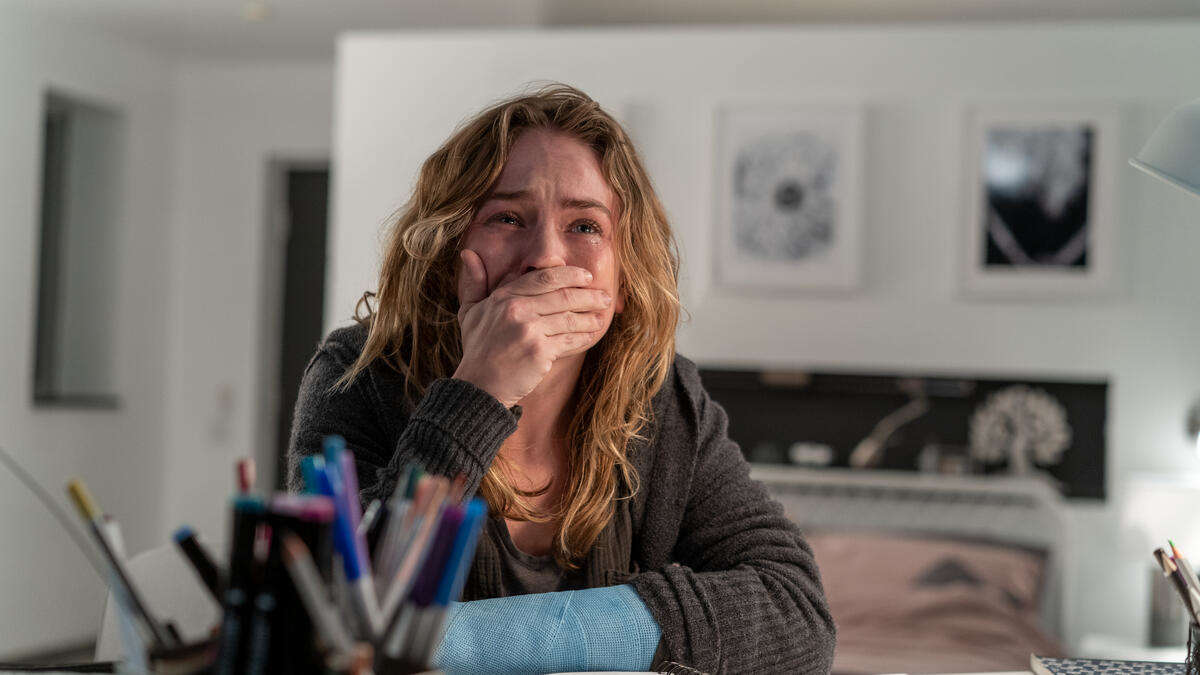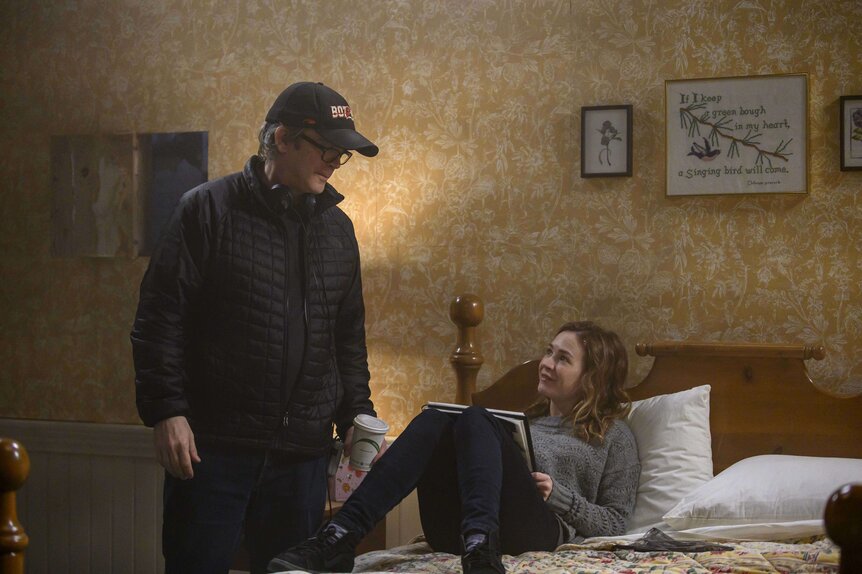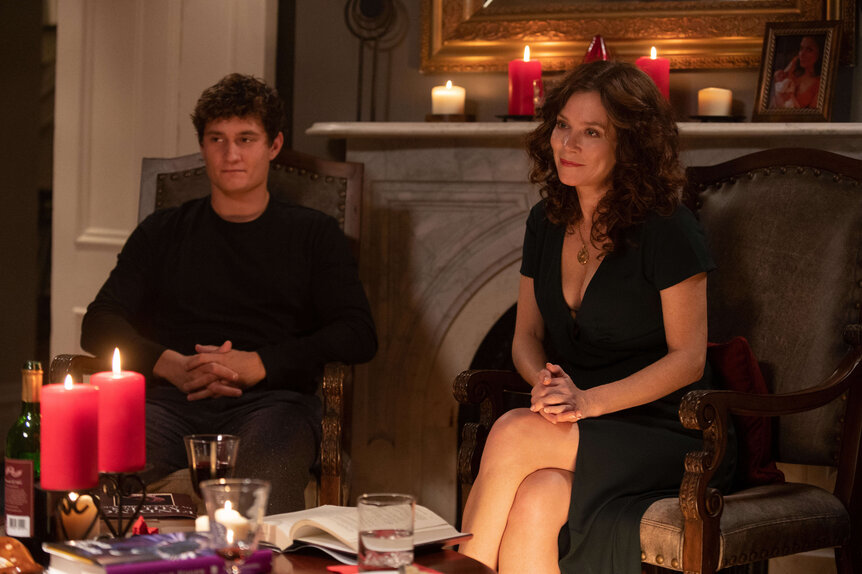Create a free profile to get unlimited access to exclusive videos, sweepstakes, and more!
Hulu's Books of Blood gave Star Trek's Brannon Braga his full-circle Clive Barker moment

When Brannon Braga’s name is cited in sci-fi circles, most people immediately think of Star Trek. He started as an intern on Star Trek: The Next Generation, then rose up through the writing ranks to showrunner of Star Trek: Voyager and Star Trek: Enterprise. He also co-wrote two Trek films, Generations and First Contact. To say he’s synonymous with the franchise isn’t wrong. But he’s also co-created many other genre series, including Threshold and Salem, and he’s now an executive producer on The Orville.
What his creative resume has so far lacked is much horror, a genre that Braga tells SYFY WIRE he considers an early, and lasting, influence on his writing career. In fact, Braga specifically pinpoints reading Books of Blood, by genre legend Clive Barker, in his early 20s as a seminal moment for him.
“I was an aspiring filmmaker at the time,” Braga reminisces. “I went to a book signing at a bookstore in Santa Monica called A Change of Hobbit. I remember standing in line for hours just to get him to sign my Books of Blood edition, which I still have.”
Thirty-five years later, Braga is a genre writer celeb in his own right, and can now even claim Barker as a friend. So much so that the two collaborated on the Hulu movie adaptation Books of Blood (dropping Oct. 7), based on classic and newly penned stories from the collection. SYFY WIRE spoke with Braga about what it’s been like to have the “pinch me” experience of collaborating with his writing hero, as well the project becoming his first feature-length directing gig.
Going back to that book signing with Barker, did he remember meeting you way back in the day?
Well, we both have different memories of that day that we crossed paths. Of course, I remember it vividly. He doesn't. [Laughs.]
When did you finally have a more mutually memorable introduction?
It was a friend of mine who introduced me to Clive over the phone, about eight years ago. We just really hit it off and have since become very good friends.
Was Books of Blood a cherished work you intended to adapt to film or television someday?
I saw different movies being made of particular stories from the Books of Blood. The most successful of which was made by [Barker], Hellraiser. In the back of my mind, I always thought, “Wouldn't it be great to do an anthology series called Books of Blood, based on the stories they're in and possibly new stories?"
How and when did you pitch it to Clive?
It took a while to get, for all sorts of reasons that I won't get into, the rights to just the title of Books of Blood, which Clive was very protective of. We optioned some of the stories. After, we really started working together, Clive and I in person, deciding which stories to use and creating new ones. I think we started really working in earnest, maybe three years ago. And it took about a year to get the script ready and a couple of years to make it.
The movie connects three separate stories: “Jenna,” “Miles,” and an opening/closing linking story. Who decided on the mix of old and new stories?
It was a fascinating experience. Fox had the options for some particular stories that I was a huge fan of. And then Tuesdays at 3 [o’clock] is the time I would go to Clive's house, and he was usually wanting to talk about Books of Blood stories that he hadn't written yet. New ideas. And I realized after a while that I related to it because, in a lot of interviews I've done, people like to talk about stuff I wrote 30 years ago. And I'm always like, “Well, what about new stuff now?” So I understood where he was coming from.
Because of the volume of stories in the collection, and how horror on television has really exploded in popularity, it feels like Books of Blood would be a natural fit as an anthology television series.
It's interesting because when we started thinking about this as a TV show, I think the only anthology out at that time was Black Mirror, which in my opinion, is one of the greatest anthologies since The Twilight Zone. There weren't a lot of them, but we could smell the door opening. We had originally sold it to Hulu as an anthology show, and by the time we were actively developing it, there were more and more anthology type shows coming out.
But by the time Hulu was ready to make a [pick-up] decision, they suggested this as an anthological film. I realized the second they suggested it, that was actually the better version of it. Because to me, these stories are exactly the right length. Like the “Jenna” story with Britt Robertson is about 40-plus minutes, and that just feels like that was the right length.
Since you are such a fan of anthology storytelling, were there any seminal examples that helped you figure out how you wanted this film to unfold?
Well, I have a special place in my heart for horror anthology and movie anthologies in general. I thought, in my mind anyway, the most successful anthology film that I've seen is Pulp Fiction. It's just seamless. I modeled it after that in that the stories don't rely on each other, but they do cross-pollinate in hopefully cool ways. And that's how it came about. Then I got together with my buddy, Adam Simon [(Carnosaur, The Haunting in Connecticut)], who has deep horror experience, and we wrote the script.
There’s a broad spectrum of horror from the more subtle work of Ari Aster’s Midsommar to the populist approach of more splatter and gore in The Walking Dead franchise. Where did you want to land with this?
Yeah, The Walking Dead was a watershed moment because that's as gory and graphic as anything I've ever seen. And it went mainstream. Who would've thought that zombie gore would go to such a broad audience? And there is also a level of sophistication that one expects from horror now. The great Ari Aster movies are examples of just a really good filmmaker. At the end of the day, a good horror movie is about a lot more than just the scares, and that makes the scares scarier.
Clive read a horror anthology as a young man that made him realize that horror could be many different things and many different tones. Horror could be even humorous. Though most people might associate Barker with Hellraiser, which is almost punk rock, that's just one of his stories. His stories are really diverse. And I believe this movie does reflect his work. Like in “Jenna,” there's some key moments that I chose to set during the daytime. I [originally] envisioned that at night and a little spookier, but my director of photography was like, “What if we made it a nice normal, regular day?” And I thought, “That's much more unexpected and that's Clive. He doesn't go the typical route.”
You assembled a great cast of character actors. How did you find them?
I had three casting people, Alana Kleiman, Erica Huggins, and of course, Sheila Jaffe, our main casting director, helping me find the right people. I was a fan of Britt Robertson [Jenna] since I saw her in Tomorrowland, where she is in virtually every frame in the movie. And I remember seeing it thinking, “This is a really good actress, she's carrying this movie.” When I heard that she was interested and had already read for it, I was stunned.
I knew Anna Friel from Pushing Daisies. She's actually who I had in mind for Mary Simon and that helps for sure. And that came down to a phone conversation. She had questions. I think she wanted to make sure that I wasn't a moron. And then there's Rafi Gavron as Simon. And it's just a wonderful ensemble that all clicked together.
How does the final movie feel to you? Satisfied, considering the long and interesting journey to get here? And would you come back to direct/write more?
This is the best version of the movie we're going to have. It was fun to make. And usually, that's a good sign. Is it perfect? Are there certain things I would go back and redo if I could? Of course. But it's pretty much what we set out to make and I'm really happy with it.
And of course, I want to do more of these things. I want to do volume two. We all do. But this is volume one and you can see from the little prologue and epilogue in the attic with Mary and the Book of Blood whose stories will be next.
Books of Blood premieres on Hulu on Oct. 7, 2020.




























